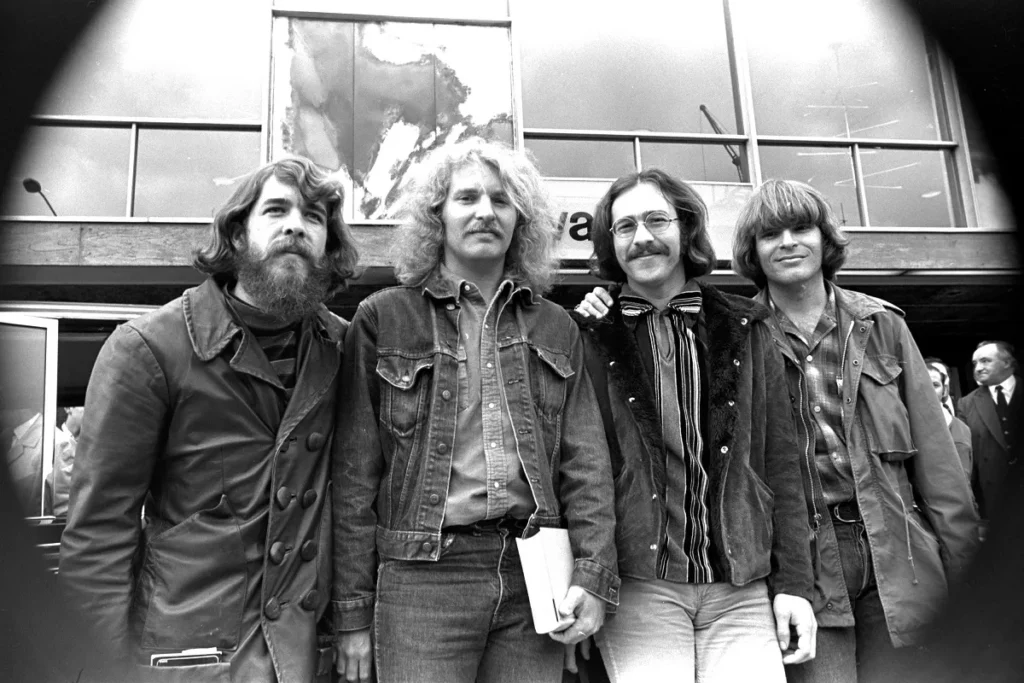
“Ninety-Nine and a Half (Won’t Do)” is a lover’s ultimatum dressed as a soul shout—a demand for the whole heart, because anything less feels like a slow kind of leaving.
Before Creedence Clearwater Revival ever turned “swamp rock” into a household phrase, they cut their teeth by paying dues to Black American rhythm & blues—and few choices on their early records reveal that devotion as clearly as “Ninety-Nine and a Half (Won’t Do)”. The song’s “first life” belongs to Wilson Pickett, released as a single in May 1966 (with “Danger Zone” on the B-side), written by Steve Cropper, Eddie Floyd, and Wilson Pickett himself. On the U.S. charts, Pickett’s version debuted at No. 76 on May 28, 1966, and after an eight-week run peaked at No. 53 on the Billboard Hot 100; on the R&B side it reached No. 13.
CCR’s version arrived two years later—not as a single aimed at radio, but as a statement of identity tucked inside their debut LP. “Ninety-Nine and a Half (Won’t Do)” appears as side two, track 1 (the album’s 4th track overall) on Creedence Clearwater Revival, released June 1968 on Fantasy Records. The recording was cut at Coast Recorders (San Francisco), with the album produced by Saul Zaentz and John Fogerty. And while the track itself wasn’t pushed as a charting single, the album still made a real commercial entrance: it reached No. 52 on the U.S. Billboard 200—a modest start that quietly positioned CCR for the avalanche that followed.
That’s the important scaffolding. Now comes the human part—the reason the song still feels alive.
The phrase “ninety-nine and a half” is the kind of line you remember even if you haven’t heard the record in years: it’s not poetic in the fancy sense, it’s poetic in the street sense. It measures love the way working people measure wages or rent—down to the fraction—then refuses the bargain. The lyric’s core idea is blunt and timeless: don’t offer me almost; don’t give me the appearance of commitment; don’t feed me the leftovers of your affection. A love that arrives in portions isn’t love at all—it’s hunger.
In Wilson Pickett’s hands, it’s a hard-edged soul sermon, shaped in the Stax/Atlantic world where desperation and groove walked together without apology. A detailed song study notes that Pickett recorded only a small handful of sides at Stax in Memphis, and calls “Ninety-Nine and a Half (Won’t Do)” the last of those singles, released in May 1966—which helps explain why it sounds so sharpened, so final, like a door being shut with dignity.
When Creedence Clearwater Revival cover it, they don’t “sanitize” that urgency—they translate it. John Fogerty doesn’t try to become Pickett; he lets the song drag him into a different kind of roughness. Even a contemporary Rolling Stone review, skeptical about the album overall, singled out Fogerty as “really believable” in Wilson Pickett’s “Ninety-Nine and a Half,” which is about as telling a compliment as you can give a young white rock singer attempting deep Southern soul.
And there’s another quiet proof that this song mattered to them: they kept playing it when the stakes were highest. At Woodstock, CCR included “Ninety-Nine and a Half (Won’t Do)” in their set—later documented on the 2019 release Live at Woodstock, where the track is credited (as it should be) to Cropper and Pickett. That’s not a casual choice. That’s a band saying, in the middle of history’s loudest weekend: these are our roots, this is our fuel.
So what does the song mean when you hear it now—when time has softened the world’s edges, but not its disappointments?
It means that self-respect is sometimes the last romance left. It means you can love someone and still refuse to be rationed. It means that a heart, when it’s tired enough, stops negotiating and starts drawing clean lines. And in CCR’s version, there’s an extra layer: the sound of a band standing slightly apart from its own era—San Francisco’s psychedelic haze all around them—choosing instead the straight road of R&B discipline, tight playing, and a voice that carries grit like it’s earned.
“Ninety-Nine and a Half (Won’t Do)” doesn’t promise a happy ending. It promises honesty. And in rock music—as in life—honesty is often the thing that keeps a song breathing long after the charts have gone silent.